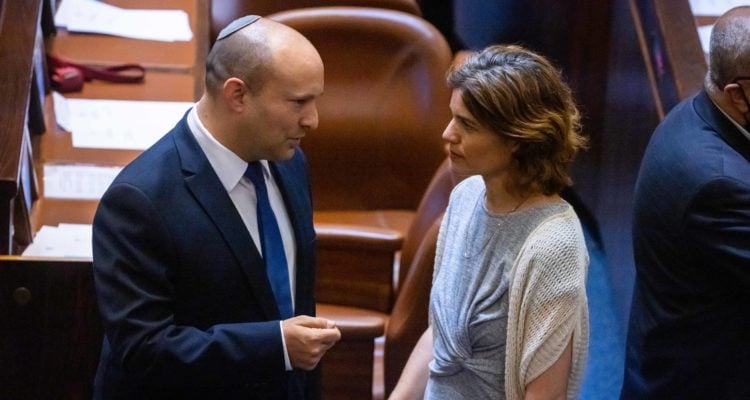The coalition consists of eight parties from across Israel’s political spectrum, including a small Islamist Arab party that has made history by joining a government for the first time.
By World Israel News and AP
If all goes according to plan, Israel will swear in a new government on Sunday, ending Prime Minister Benjamin Netanyahu’s record 12-year rule.
The next government, which will be led by Naftali Bennett of the Yemina party, has vowed to chart a new course.
The coalition consists of eight parties from across Israel’s political spectrum, including a small Islamist Arab party that has made history by joining a government for the first time.
If even one party bolts, the government would be at serious risk of collapse, and Netanyahu, who intends to stay on as opposition leader, is waiting in the wings.
The coalition holds only a slight majority in the 120-member Knesset and includes parties from the right, left and center. Each party signed a coalition agreement ahead of a Friday deadline, keeping the transition on track.
But just about the only things they agree on are that Netanyahu, who is on trial for corruption, should leave office, and that the country cannot endure another back-to-back election.
They are expected to adopt a modest agenda acceptable to Israelis from across the ideological divide that steers clear of hot-button issues. Their first big challenge will be to agree on a budget, the first since 2019. Economic reforms and infrastructure spending may follow.
Bennett will serve as prime minister for the first two years, followed by Yair Lapid, a former journalist and vocal critic of Netanyahu. But that’s only if the government survives that long.
Bennett is a religious Zionist who has in the past supported expansion of Jewish communities in Judea and Samaria. He has also opposed to a Palestinian state.
But he risks losing his job if he alienates his left-wing coalition partners.
That could mean a continuation of Netanyahu’s approach of managing the decades-old conflict without trying to end it. Annexing Jewish communities in Judea and Samaria and neutralizing the Hamas terror group Gaza are probably off the table, but so are any major concessions to the Palestinians.
Every Israeli government has expanded Jewish settlements in Judea and Samaria, the biblical heartland, which Israel gained control of in the 1967 war.
The Palestinians claim all of Judea and Samaria, including the land where decades-old Jewish communities exist, for their future state.
The Biden administration has pushed Israel to stop expanding Jewish presence in Judea and Samaria.
The new government is expected to maintain Netanyahu’s stance on the Iranian nuclear threat and oppose President Joe Biden’s efforts to revive its international nuclear deal.
But senior officials have already vowed to do so behind closed doors rather than bringing the rift out into the open, as Netanyahu was forced to do during the Obama years.
The new government will also likely work with Biden to strengthen ties with Arab states, a policy that the Trump administration pursued with unprecedented success, including four new Israel-Arab peace treaties collectively known as the Abraham Accords.
“The government will work for all the Israeli public — religious, secular, ultra-Orthodox, Arab — without exception, as one,” Bennett said Friday. “We will work together, out of partnership and national responsibility, and I believe we will succeed.”
The United Arab List, a small party with Islamist roots led by Mansour Abbas, is the first Arab party to sit in a coalition. In return for helping to oust Netanyahu, he is expected to secure large budgets for housing, infrastructure and law enforcement in Arab communities.
Israel’s Arab citizens make up 20% of the population. Tensions boiled over during last month’s Gaza war, when Arabs attacked Jews in Israel’s mixed cities, leading to the deaths of two Jews and the destruction of over 100 homes and 10 synagogues.
The new government already faces hostility from Israel’s ultra-Orthodox community — staunch supporters of Netanyahu.
Earlier this week, ultra-Orthodox leaders condemned it in harsh terms, with one demanding Bennett remove his kippa, the skullcap worn by observant Jews.
After a quarter-century at the highest levels of Israeli politics, no one expects the 71-year-old Netanyahu to quietly retire.
As opposition leader and the head of the largest party in parliament, Netanyahu is expected to continue doing everything in his power to bring down the government.
Bennett, already branded a traitor by much of the right-wing base he shares with Netanyahu, heads a tiny party and is unlikely to get another shot at the top job.
Netanyahu could meanwhile face a challenge from within his defeated Likud party, which includes a number of would-be successors. They believe that without Netanyahu leading the party, the Likud would be able to assemble a strong, stable, right-wing government. But Netanyahu retains a strong hold on the party’s institutions and its base, and senior members are unlikely to challenge him.





